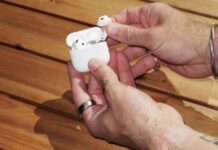Apple’s New AirPods: Revolutionizing Hearing Aids in America
In a world where technology continues to evolve at a rapid pace, Apple has once again made headlines with its latest innovation: turning the AirPods Pro into clinical-grade hearing aids. This groundbreaking development not only showcases Apple’s commitment to accessibility and innovation but also highlights the influence of key political figures in making this technology available to the masses.
The Evolution of AirPods Pro
For many, AirPods Pro have been a game-changer in the realm of wireless earbuds. With their sleek design and noise-cancelling capabilities, they have become a staple for professionals and casual users alike. However, the idea of utilizing them as hearing aids was once merely a thought in the back of many minds. That is until Apple received FDA authorization to turn the AirPods Pro into hearing aids, marking a significant shift in the accessibility of hearing assistance devices.
The Future of Hearing Aid Technology
The new generation of AirPods Pro is set to serve as clinical-grade hearing aids, giving individuals with mild to moderate hearing impairment a more affordable and convenient option compared to traditional hearing aids. Priced at $249 in the US and £229 in the UK, these over-the-counter devices provide a cost-effective solution for those in need of hearing assistance. By utilizing the customisation software provided by Apple, users can take an on-demand hearing test on their iPhone’s health app to generate an audiogram that will program the AirPods Pro accordingly. This innovative approach not only simplifies the process of obtaining hearing aids but also empowers individuals to take control of their hearing health.
The Role of Legislation in Accessibility
The journey towards making over-the-counter hearing aids a reality was not without its challenges. The FDA’s longstanding requirement for a prescription for any device that goes into a human ear posed a significant barrier to accessibility. However, with the passing of the Over-the-Counter Hearing Aid Act in 2017, spearheaded by senators Elizabeth Warren and Chuck Grassley and signed by Donald Trump, the tide began to turn. This legislation paved the way for greater access to hearing aids without the need for a prescription, ultimately leading to the development of Apple’s new hearing aid AirPods. The intersection of technology, law, and politics played a crucial role in breaking down barriers and making hearing aids more widely available to those in need.
Implications for the Healthcare Industry
The introduction of Apple’s new hearing aid AirPods marks a significant shift in the healthcare industry, particularly in the realm of hearing assistance devices. While traditional hearing aids offer the undivided attention of audiologists and cater to individuals with severe hearing difficulties, the AirPods Pro cater to a different demographic – those with mild to moderate hearing impairment. By leveraging technology and user-friendly software, Apple has bridged the gap between accessibility and affordability, providing a viable alternative to traditional hearing aids. This shift in the landscape of hearing aid technology not only benefits individuals in need of hearing assistance but also challenges the status quo of the healthcare-regulatory establishment.
The Intersection of Technology and Policy
The development of Apple’s new hearing aid AirPods serves as a poignant reminder that technology does not exist in a vacuum. The interplay between engineering, science, law, and policy shapes the way in which technologies are developed and deployed. In the case of over-the-counter hearing aids, legislation played a crucial role in breaking down barriers and fostering innovation in the realm of hearing assistance devices. The collaboration between key political figures, including senators Elizabeth Warren and Chuck Grassley, and the support of the Trump administration, highlights the importance of policy in driving accessibility and affordability in healthcare technology.
Conclusion
Apple’s new hearing aid AirPods represent a significant milestone in the evolution of hearing aid technology. By reimagining the AirPods Pro as clinical-grade hearing aids, Apple has not only revolutionized the accessibility of hearing assistance devices but has also challenged the traditional norms of the healthcare industry. Through a combination of innovative technology, user-friendly software, and supportive legislation, Apple has paved the way for a more inclusive and affordable approach to hearing health. As we look towards the future, it is essential to recognize the role of policy in shaping the accessibility of healthcare technologies and the potential for technology to empower individuals to take control of their health and well-being.

















